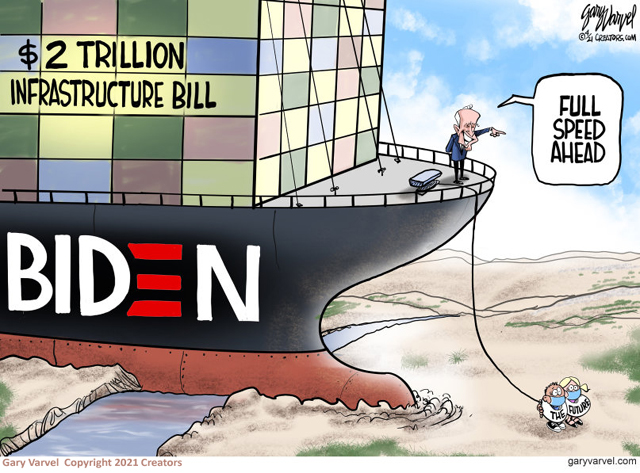President Biden has outlined a $2 trillion plan to invest in the country’s infrastructure, creating millions of jobs in the process, calling it a transformational effort that could create the “most resilient, innovative economy in the world.”
“It’s time to build our economy from the bottom up and the middle out, not the top down,” he declared while speaking outside Pittsburgh today, calling the plan “a once-in-a-generation investment in America, unlike anything we’ve seen or done since we built the interstate highway system and the space race decades ago.”
The plan aims to revitalize U.S. transportation infrastructure, water systems, broadband and manufacturing, among other goals such as addressing climate change and racial inequities and raising corporate taxes.
Biden’s proposal would:
- Put $621 billion into transportation infrastructure such as bridges, roads, public transit, ports, airports and electric vehicle development
- Direct $400 billion to care for elderly and disabled Americans
- Inject more than $300 billion into improving drinking-water infrastructure, expanding broadband access and upgrading electric grids
- Put more than $300 billion into building and retrofitting affordable housing, along with constructing and upgrading schools
- Invest $580 billion in American manufacturing, research and development and job training efforts
Officials said that, if approved, the spending in the plan would end decades of stagnation in federal investment in research and infrastructure — and would return government investment in those areas, as a share of the economy, to its highest levels since the 1960s.
An increase in the corporate tax rate to 28% and measures designed to prevent offshoring of profits will fund the spending.
Biden’s infrastructure proposal has pleased analysts at the American Society of Civil Engineers which has been releasing an Infrastructure Report Card every four years for over two decades, and the evaluations have never been very positive.
This month the group published its latest report, giving the United States’ infrastructure a C- over all.
“It’s nice to see the comprehensive approach,” Emily Feenstra, the engineering society’s managing director for government relations and infrastructure initiatives, said in an interview with the New York Times. “Not just roads, bridges, transit — which are important — but also water, schools, things that can alleviate storms’ impact.”
Most of the nation’s infrastructure needs are longstanding, and many have to do with climate change –the plan would fix 20,000 miles of roads and 10,000 bridges.
Biden’s proposal offers a framework, but he will have to work with Congress to write the legislation. Last year the Democratically controlled House trotted out a $1.5 trillion infrastructure bill, the Moving Forward Act, elements of which could wind up in a final bill. It included hundreds of billions of dollars for repairing roads and bridges, funding other transit projects, making improvements to school buildings, constructing affordable housing and enhancing broadband access.
Parts of other bills floating around the House could also wind up in the final package, including the CLEAN Future Act, which would lay out a plan to eliminate fossil fuels from the United States’ electricity supply by 2035, and the Intercity Passenger Rail Trust Fund Act, which seeks to stabilize Amtrak’s funding by creating a trust fund.








